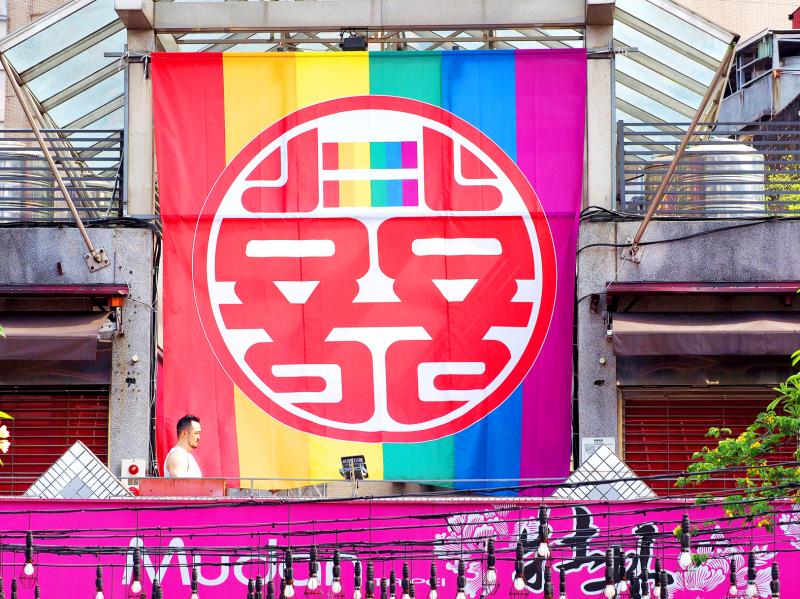Same-sex marriages involving a Chinese spouse might soon be recognized, as the Mainland Affairs Council (MAC) yesterday said it plans to amend cross-strait regulations to conform with an amendment looking to recognize all international same-sex marriages.
Although marriage equality was legalized in 2019, the law only allows for marriages in which both partners are from countries that recognize their union.
The Judicial Yuan in January proposed amendments that would recognize all international same-sex marriages involving a Taiwanese national, although the changes, if passed by the legislature, would not cover Chinese partners.

Photo:David Chang, EPA-EFE
To bring cross-strait law in line with the proposed changes and ensure Taiwanese’s right to marry, the council said it is drawing up changes to the Act Governing Relations Between the People of the Taiwan Area and the Mainland Area (臺灣地區與大陸地區人民關係條例).
The aim is to satisfy procedural and substantive justice by avoiding legal discrepancies in adjudication, the council said.
In the Judicial Yuan’s proposal, Article 46 of the Act Governing the Choice of Law in Civil Matters Involving Foreign Elements (涉外民事法律適用法) would be changed to prioritize Taiwanese marriage law in the event that national laws differ for each partner.
The council said its amendment would state that provisions of the foreign elements law “shall apply for civil matters involving the mainland area, unless otherwise provided in this act.”
As China does not recognize same-sex unions, couples have no way of obtaining a notarized marriage certificate in China for the Straits Exchange Foundation to verify, an official with knowledge of the matter said yesterday.
Without a certificate, they also have no way of getting an interview with the National Immigration Agency, which is required before a cross-strait marriage can be registered in Taiwan, he said, adding that these and other administrative procedures would also need to be changed.
If the amendment is passed, the official recommended that no longer requiring a Chinese marriage certificate and jumping straight to an interview.
However, he also said that the immigration agency should be extremely strict in its assessments of couples to prevent the use of “fake marriages” as an infiltration tactic by China.

Taiwan has received more than US$70 million in royalties as of the end of last year from developing the F-16V jet as countries worldwide purchase or upgrade to this popular model, government and military officials said on Saturday. Taiwan funded the development of the F-16V jet and ended up the sole investor as other countries withdrew from the program. Now the F-16V is increasingly popular and countries must pay Taiwan a percentage in royalties when they purchase new F-16V aircraft or upgrade older F-16 models. The next five years are expected to be the peak for these royalties, with Taiwan potentially earning

STAY IN YOUR LANE: As the US and Israel attack Iran, the ministry has warned China not to overstep by including Taiwanese citizens in its evacuation orders The Ministry of Foreign Affairs (MOFA) yesterday rebuked a statement by China’s embassy in Israel that it would evacuate Taiwanese holders of Chinese travel documents from Israel amid the latter’s escalating conflict with Iran. Tensions have risen across the Middle East in the wake of US and Israeli airstrikes on Iran beginning Saturday. China subsequently issued an evacuation notice for its citizens. In a news release, the Chinese embassy in Israel said holders of “Taiwan compatriot permits (台胞證)” issued to Taiwanese nationals by Chinese authorities for travel to China — could register for evacuation to Egypt. In Taipei, the ministry yesterday said Taiwan

Taiwan is awaiting official notification from the US regarding the status of the Agreement on Reciprocal Trade (ART) after the US Supreme Court ruled US President Donald Trump's global tariffs unconstitutional. Speaking to reporters before a legislative hearing today, Premier Cho Jung-tai (卓榮泰) said that Taiwan's negotiation team remains focused on ensuring that the bilateral trade deal remains intact despite the legal challenge to Trump's tariff policy. "The US has pledged to notify its trade partners once the subsequent administrative and legal processes are finalized, and that certainly includes Taiwan," Cho said when asked about opposition parties’ doubts that the ART was

If China chose to invade Taiwan tomorrow, it would only have to sever three undersea fiber-optic cable clusters to cause a data blackout, Jason Hsu (許毓仁), a senior fellow at the Hudson Institute and former Chinese Nationalist Party (KMT) legislator, told a US security panel yesterday. In a Taiwan contingency, cable disruption would be one of the earliest preinvasion actions and the signal that escalation had begun, he said, adding that Taiwan’s current cable repair capabilities are insufficient. The US-China Economic and Security Review Commission (USCC) yesterday held a hearing on US-China Competition Under the Sea, with Hsu speaking on